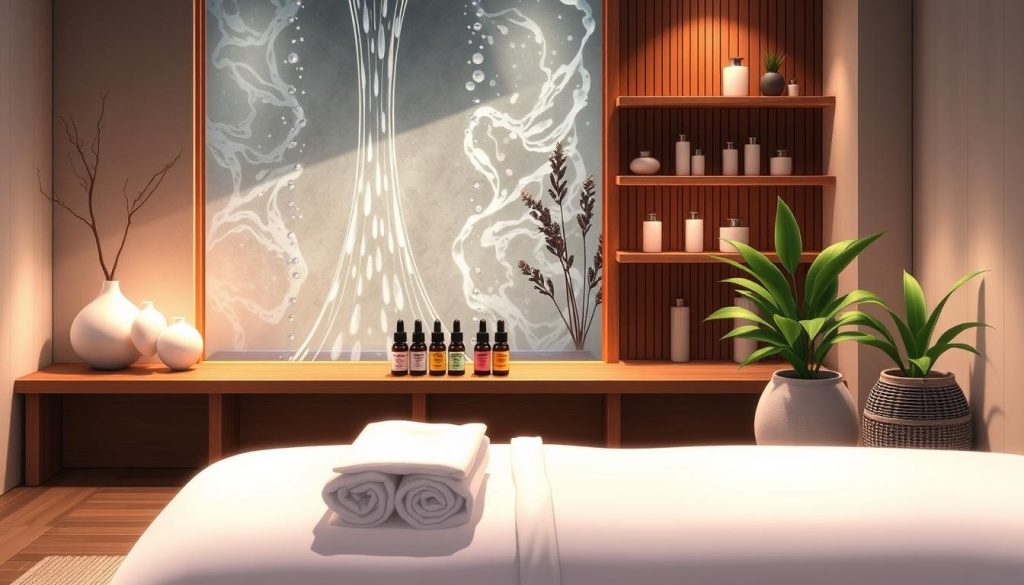Proper massage etiquette is key for a great experience. It helps you get the most out of your treatment. Small actions can make a big difference in your massage quality.
Massage therapists are skilled healthcare pros who ease muscle tension. They also boost circulation and relaxation. Clients play a big role in creating a positive massage experience too.
Following simple protocols shows respect for your therapist’s skills. It helps build a trusting, therapeutic bond.
60% of therapists suggest showering before a session. This improves absorption of therapeutic elements. 75% warn against strong scents that can cause allergic reactions.
These small details can greatly impact your massage treatment. They can make a big difference in how effective your session is.
We’ll explore key dos and don’ts for massage clients. You’ll learn valuable tips for a great experience. We’ll cover dressing right and respecting boundaries.
Key Takeaways:
- Dress in comfortable, stretchy clothing that allows for easy movement during the massage
- Communicate openly with your therapist about pressure preferences, health conditions, and any discomfort
- Maintain good personal hygiene by showering before your appointment and managing body odor
- Respect the quiet, relaxing atmosphere of the massage room and avoid disruptive behavior
- Understand and adhere to the therapist’s professional boundaries and cancellation policies
Understanding Massage Etiquette
Massage etiquette ensures a positive experience for clients and therapists. It creates a comfortable, respectful environment for your massage appointment. Learning these massage do’s and don’ts will help you enjoy a more relaxing session.
Arriving on time is crucial for massage etiquette. It allows you to enjoy the full session without feeling rushed. If you’re late, inform your therapist as soon as possible.
Tipping is a common practice in massage therapy. It shows appreciation for excellent service and acknowledges the therapist’s effort. While not mandatory, tipping is generally appreciated.
| Parking Location | Cost | Additional Information |
|---|---|---|
| City of Calgary Lot 888 (Zone 9888) | $1.76 for the first 2 hours | Most cost-effective option |
| Impark Lot 133 and Lot 253 | Varies | Located across the street |
| Riverfront Avenue and 2 Avenue | Free after 6:00 pm on weekdays | Street parking available |
Hygiene is vital in massage etiquette. Clean skin enhances your experience and shows respect for your therapist. Avoid alcohol, painkillers, marijuana, and smoking before your appointment.
These substances can alter your body’s response to massage. They may cause discomfort or affect the therapist’s sensitivity to smell.
Proper massage etiquette is about creating a respectful and comfortable environment for both the client and the therapist.
Following these guidelines ensures a pleasant and effective massage experience. Open communication and mutual respect are key to a successful massage appointment.
Dressing for Your Massage
Choosing the right attire for your massage is crucial for comfort and relaxation. At Sevati Massage and Wellness in Portland, OR, we cater to all comfort levels. Our goal is to provide the best massage experience possible.
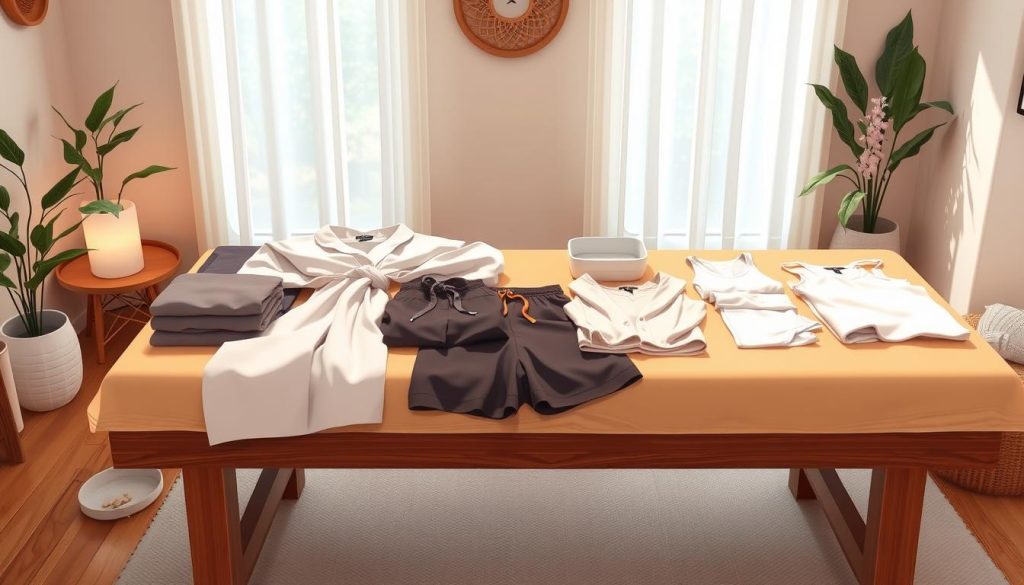
Some clients prefer to undress completely, while others feel better keeping some clothes on. You can stay fully clothed, partially bare, or remove all clothing. Our skilled therapists will ensure your comfort throughout the session.
Dress Down to Your Comfort Level
Consider these guidelines when deciding on your massage attire:
- Choose stretchy, comfortable clothing that allows for easy movement during your massage.
- Avoid garments that require dry-cleaning, as lotions and body oils used during massages can damage such clothing.
- Consider bringing an extra change of clothes that doesn’t require dry-cleaning.
- Communicate your preferences with your therapist to ensure your comfort.
Wear Stretchy, Comfortable Clothing
Stretchy, comfy clothes are key for a relaxing massage. Many clients come for massages during lunch breaks or after work. This makes everyday wear a popular choice for appointments.
| Clothing Item | Suitability for Massage |
|---|---|
| Loose-fitting t-shirt | Excellent |
| Stretchy yoga pants | Excellent |
| Sweatpants | Good |
| Shorts | Good |
| Jeans | Not recommended |
| Dress shirts | Not recommended |
Our massage therapists are professionals focused on releasing muscle tension. They prioritize anatomy and muscle tension over external features. There’s no need to feel embarrassed about your body during a massage.
At Sevati Massage and Wellness, we believe that every client deserves a personalized, comfortable massage experience tailored to their individual needs and preferences.
Follow these simple guidelines for massage attire. Communicate your preferences with your therapist. This ensures a relaxing and rejuvenating experience at Sevati Massage and Wellness in Portland, OR.
Embracing Your Body
Massage therapy requires embracing your body and letting go of insecurities. Your therapist is a professional focused on your well-being, not your appearance. Massage harmonizes energy flow and promotes relaxation.
Body image concerns can make people hesitant to book massages. Therapists see diverse body types and aim to help you feel your best. Accept your body to fully enjoy the massage experience.
Let Go of Body Consciousness
To enjoy a relaxing massage, leave your insecurities at the door. Your therapist genuinely cares about helping people feel better. They create a nurturing environment for you to unwind and release tension.
Massage Therapists Focus on Muscles, Not Appearance
Therapists understand the body’s intricate workings, including muscular and skeletal systems. They identify and alleviate areas of tension, knots, and tightness. Their goal is to help you achieve deep relaxation and improved physical function.
Embrace your body to fully immerse yourself in the massage experience. Massage promotes physical, emotional, and mental well-being. Prioritize body acceptance to benefit from the transformative power of massage.
Handling Body Hair Concerns
Many people worry about their body hair before a massage. But massage therapists are trained professionals who work with all types of bodies. They focus on providing a relaxing and beneficial massage experience.
If you prefer removing body hair, do so a few hours before your appointment. This allows time for any skin irritation to subside. Shaving right before a massage can lead to discomfort or post-massage skin irritation.
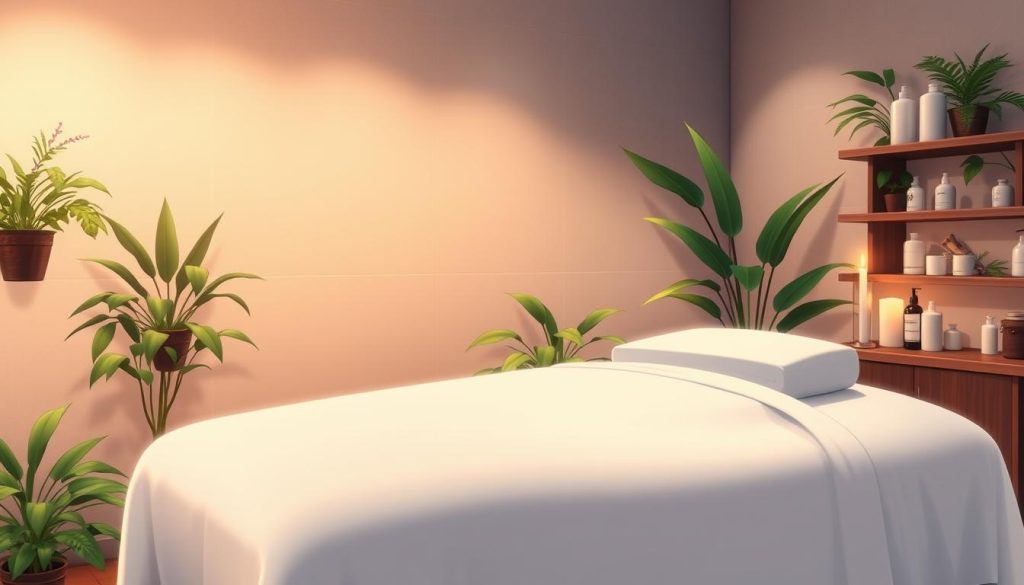
A survey by the American Massage Therapy Association revealed interesting findings. Over 70% of massage therapists regularly work with clients who have varying amounts of body hair. This shows that body hair is common and natural.
If you’re self-conscious, talk to your massage therapist. They can suggest positioning or draping to help you feel more comfortable. The goal is for you to relax and enjoy the massage’s benefits.
“In my 15 years of experience as a massage therapist, I’ve never once been bothered by a client’s body hair. It’s a natural part of the human body, and my focus is always on providing a safe, comfortable, and effective massage experience.” – Sarah, Licensed Massage Therapist based in Michigan
Removing body hair before a massage is a personal choice. You can shave, wax, or keep your natural hair growth. Your therapist is there to support you and help you feel your best.
Let go of body hair concerns and enjoy your massage. Focus on the relaxation and rejuvenation that awaits you. Your comfort is key to a great massage experience.
Skipping the Extra Efforts
Comfort and simplicity are key when preparing for your massage. Skip unnecessary extras that might hinder your relaxation. Focus on keeping things simple for the best massage preparation.
Avoid Wearing Heavy Makeup or Perfume
Heavy makeup and strong perfume can be counterproductive at massage appointments. These products may rub off on table linens and overwhelm your therapist.
83% of massage therapists use oils, lotions, or powders during sessions. Your perfume might clash with these products, affecting your massage experience.
“I always advise my clients to avoid wearing heavy perfumes or makeup to their appointments. It allows us to focus on providing the best possible massage experience without any distractions.” – Sarah, Licensed Massage Therapist
Minimize Jewelry and Accessories
When thinking about what not to wear to a massage, limit jewelry and accessories. Bulky items can interfere with your therapist’s work.
Remove jewelry that might snag on linens or cause discomfort. Simple pieces like small earrings are usually fine.
By keeping things simple, you’ll be ready to fully enjoy your massage. Your therapist is there to help you unwind, not judge your appearance.
Let go of distractions and be present in the moment. This approach will enhance your relaxation and overall massage experience.
Allowing Yourself to Relax
The goal of a massage is to release tension and stress. As you lie on the table, let your therapist’s skilled hands work out knots. Your body and mind will naturally unwind into deep relaxation during massage.
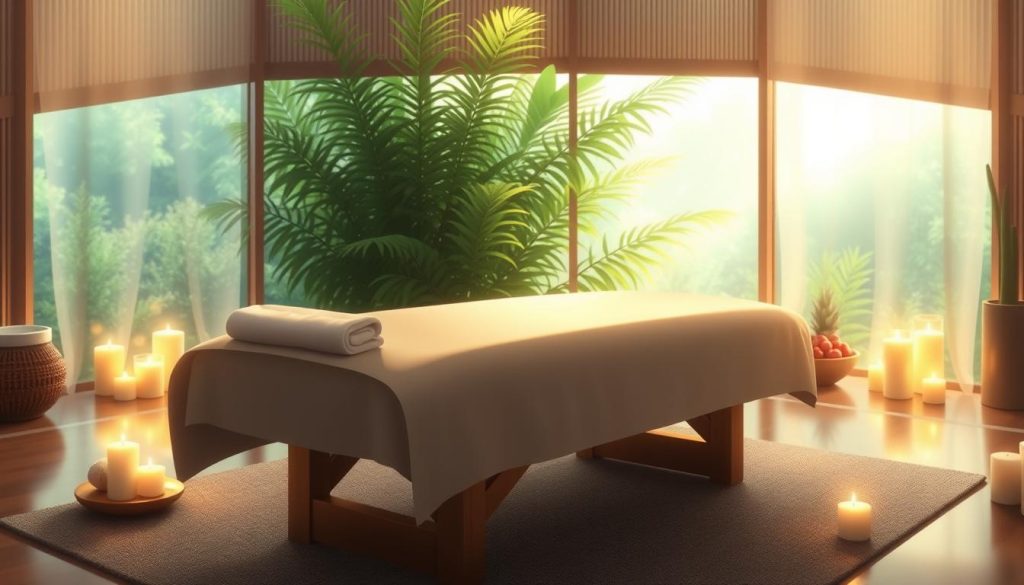
It’s perfectly fine to fall asleep during a massage session. Sleeping during massage is common and often seen as a positive sign. It shows you’re truly letting go and allowing the massage and rest to work effectively.
The Benefits of Sleeping During Massage
Falling asleep during a massage indicates your body is responding well to the treatment. This deep relaxation state offers several benefits.
- Enhanced stress relief and reduced anxiety
- Improved sleep quality and duration
- Increased feelings of rejuvenation and well-being
- Deeper level of massage and rest
Your therapist will take your sleep as a compliment. It shows you trust them and feel safe. They’ll continue working on your muscles with the same care, whether you’re awake or asleep.
“The best way to relax is to just let go and allow yourself to be in the moment. If sleep comes, embrace it as part of your massage experience.”
Tips for Enhancing Relaxation During Massage
To achieve deep relaxation during massage and potentially fall asleep, try these tips:
| Tip | Benefit |
|---|---|
| Breathe deeply and slowly | Promotes relaxation and reduces stress |
| Focus on the sensations of touch | Helps quiet the mind and stay present |
| Choose a quiet, comfortable environment | Minimizes distractions and enhances relaxation |
| Communicate your preferences | Ensures the massage meets your needs and comfort level |
Massage provides a space for massage and rest, allowing your body and mind to recharge. Embrace sleep during your session as a sign of full immersion. It shows you’re reaping the benefits of deep relaxation during massage.
Maintaining Personal Hygiene
Personal hygiene is vital for a great massage experience. Simple steps show respect for your therapist. They also make your session more comfortable and relaxing.
Shower Before Your Appointment
Showering before your massage is key to massage hygiene. It removes dirt, sweat, and odors from your skin. This cleanliness and massage etiquette creates a pleasant atmosphere for your session.
Manage Sweat and Odors
Coming from a workout? Manage sweat and odors first. Massage and body odor can distract both you and your therapist. Use a towel to dry excess sweat.
Apply a light, unscented deodorant to minimize odors. This helps everyone relax during your massage session.
| Hygiene Tips | Benefits |
|---|---|
| Shower before appointment | Removes dirt, sweat, and odors |
| Manage sweat and odors | Creates a more pleasant atmosphere |
| Avoid strong perfumes or colognes | Prevents overwhelming scents |
| Maintain good oral hygiene | Ensures client comfort |
Studies show good hygiene prevents infectious diseases in massage. Therapists should trim nails, avoid smoking, and change clothes between sessions. These massage hygiene practices ensure safe, comfortable experiences for everyone.
Good hygiene is not just about being clean, it’s about being respectful to yourself and others.
Freshening up before your massage shows good cleanliness and massage etiquette. It sets the stage for a relaxing session. Your therapist will appreciate your efforts.
You’ll be able to fully enjoy the benefits of your massage. Take a moment to prepare and make the most of your experience.
Communicating with Your Massage Therapist
Good communication is key to a great massage experience. Your therapist needs your feedback to meet your needs. Speak up about your preferences for a comfortable and effective massage.
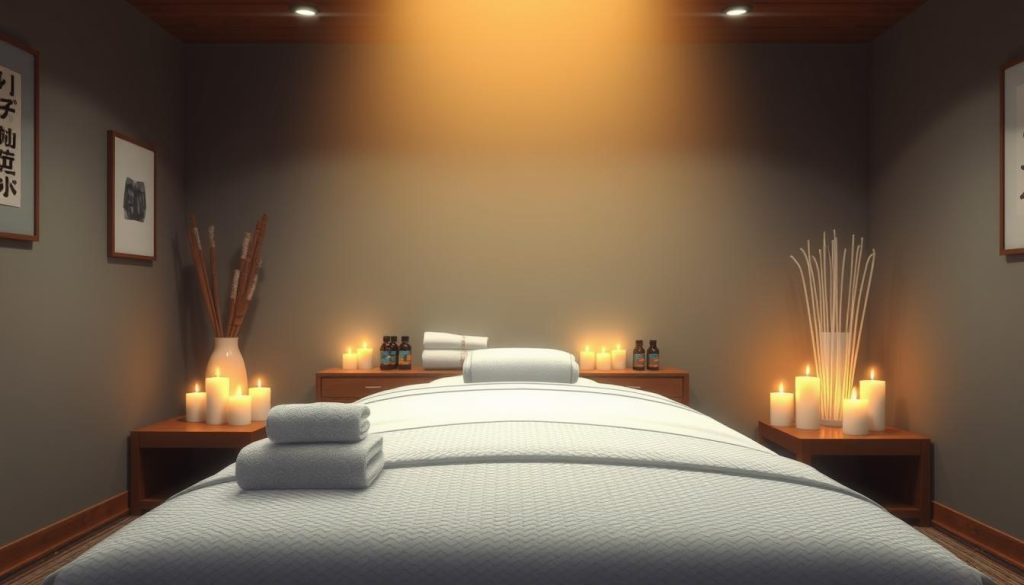
Don’t Be Afraid to Ask Questions or Voice Concerns
Voice any questions or concerns you have about your massage. Your therapist wants you to feel informed and relaxed. Asking questions can improve your overall experience.
Speak Up About Pressure Preferences and Comfort Levels
Everyone has different likes for massage pressure and comfort levels. Tell your therapist what you prefer. They’ll adjust their technique to suit you.
If you feel uncomfortable or the pressure isn’t right, let them know. Your therapist will appreciate your feedback and make changes for your massage comfort.
| Communication Tip | Benefit |
|---|---|
| Arrive 5-10 minutes early | Allows time to settle in, discuss goals, and relax before starting |
| Speak up if anything feels uncomfortable | Ensures a successful session by addressing pressure, temperature, or body position concerns |
| Avoid excessive talking | Helps therapist focus and allows client to fully relax |
| Provide positive feedback or reviews post-massage | Enhances spa services and experience for future clients |
Massage communication goes both ways. Share your needs and likes with your therapist. This helps them give you the best care possible. Your body and mind will thank you!
Respecting the Quiet
The massage room is a peaceful sanctuary. It’s designed for relaxation and rejuvenation. To fully benefit from your massage, embrace the silence and reduce noise.
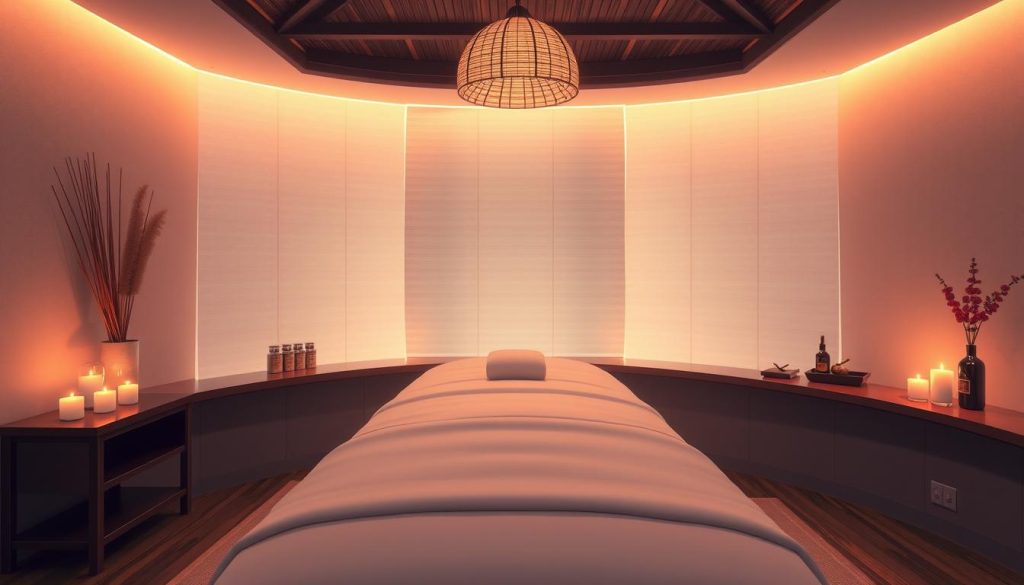
Some clients enjoy light chat during sessions. However, many prefer to unwind in quiet. Studies show the ideal silent period is about an hour.
This silence allows the mind and body to release tension. It helps you drift into a meditative state.
Your therapist will set the tone for the session. If they talk, respond softly and briefly. If they’re silent, follow their lead.
Silence is not an absence but a presence. – Anne D. LeClaire
Your therapist focuses on delivering a tailored treatment. Too much talk can disrupt their concentration. Communicate quietly only when necessary.
Respecting quiet during your massage allows for deep relaxation. It creates space for self-reflection and healing. Embrace the silence to disconnect from the world.
Use this time to reconnect with yourself. Let the power of touch work its magic.
Timing Your Meals
The timing of your meals can impact your massage experience. Eating a large meal before your session may cause discomfort. It can also reduce the benefits of the treatment.
Avoid heavy meals within an hour of your appointment. Massage can stimulate digestion, causing discomfort on a full stomach. If hungry, choose a light, easily digestible snack instead.
Consider these facts when planning your pre-massage meal:
| Recommended Time to Avoid Heavy Meals Before Massage | 1 hour |
|---|---|
| Ideal Snack Options | Fresh fruit, yogurt, granola bar |
| Percentage of People Who Experience Discomfort from Eating Before Massage | 30% |
The Science Behind Massage and Digestion
Massage activates your body’s “rest and digest” response. It increases blood flow to digestive organs and promotes enzyme release. This is generally good for health.
However, it can cause discomfort after a large meal. The mix of increased digestion and massage pressure may lead to bloating or nausea.
“Eating a heavy meal before a massage can interfere with the body’s ability to relax and may cause discomfort during the session. It’s best to allow your body time to digest before receiving a massage treatment.”
Tips for Optimal Massage Timing
To maximize your massage and avoid discomfort, follow these tips:
- Schedule your massage at least one hour after a meal
- If you need a snack, choose something light and easily digestible, such as fresh fruit or a small yogurt
- Stay hydrated by drinking plenty of water before and after your massage
- Communicate any digestive concerns or sensitivities to your massage therapist before the session begins
Be mindful of your eating habits and massage timing. This ensures a more relaxing and beneficial experience. Your massage therapist is there to help you feel your best.
Don’t hesitate to ask questions about eating before massage. Voice any concerns you may have to your therapist.
Recognizing Professional Boundaries
Respect professional boundaries with your massage therapist. They create a safe, healing environment. Clear boundaries foster trust between client and therapist.
Strong therapeutic relationships lead to higher client satisfaction. This builds loyal client bases. Better relationships also improve treatment outcomes and patient adherence.
Massage Therapists Are Healthcare Professionals
Massage therapists are trained, licensed professionals. They study anatomy, physiology, and massage techniques. Treat them with the same respect as other healthcare providers.
Inappropriate Requests or Advances Are Unacceptable
Massage therapists maintain a safe, professional environment. Inappropriate comments or advances can end the session immediately. Massage misconduct is not tolerated.
- Requesting sexual favors or making suggestive comments
- Attempting to touch the therapist inappropriately
- Asking personal questions unrelated to the massage treatment
- Disrobing beyond your comfort level or therapist’s instructions
Strong massage boundaries protect the therapist and improve your treatment. Maintain respect throughout your session. This ensures a positive experience for everyone involved.
Preparing for Your Massage Appointment
Good preparation enhances your massage experience. A few simple steps before your appointment can ensure a comfortable and beneficial session.
Arrive a Few Minutes Early
Plan to arrive 15-20 minutes before your massage appointment. This gives you time for check-in and paperwork. You can also discuss your health history with your therapist.
Early arrival allows you to unwind and mentally prepare. This sets the stage for a more relaxing experience.
Be Open About Your Health Conditions and Injuries
Share any health conditions or injuries during the intake process. This information helps your therapist adapt their techniques for your needs. They can ensure a safe and effective massage tailored to you.
Common health conditions to mention include:
- Muscle tension and stiffness
- Joint flexibility issues
- Tension points
- Breathing difficulties
- Posture problems
- Stress and anxiety
Open communication helps maximize your massage benefits. It allows your therapist to focus on areas needing extra attention. They can also avoid techniques that might not suit your condition.
Hydrated muscles are softer and more workable, so be sure to drink plenty of water before your massage to prepare your body.
Light stretching or yoga before your appointment can loosen up your muscles. This can make your massage more effective. Discuss any wounds or skin conditions with your therapist beforehand.
Cancellation Etiquette
Scheduling a massage requires respect for the therapist’s time and massage policies. Life can be unpredictable, leading to cancellations or rescheduling. Following proper cancellation etiquette maintains a positive relationship with your therapist.
Provide Timely Notice If You Can’t Make Your Appointment
Give as much notice as possible when canceling or rescheduling. Most therapists have policies to protect their time and business. Failure to offer proper notice of cancellations can result in a cost for the scheduled service.
Escapes Spa warns that frequent cancellations without 24-hour notice may limit future online reservations. Timely notice allows therapists to adjust their schedule and serve other clients.
Understand and Respect Cancellation Policies
Before booking, familiarize yourself with the therapist’s or spa’s cancellation policies. These ensure fairness and respect for the therapist’s time and expertise. Understanding these policies is key to proper massage etiquette.
“It is vital for clients to respect the boundaries set by the masseuse regarding touching and communication during a massage session.”
Your therapist reserves time specifically for you. Last-minute cancellations can greatly impact their business. Adhering to policies shows respect and fosters a positive, long-lasting relationship.
Massage Dos and Don’ts: Etiquette Every Client Should Know
Understanding proper massage guidelines is key for a great experience. Follow these dos and don’ts to show good massage behavior. You’ll ensure a positive session for both you and your therapist.
Always talk openly with your therapist. Over 80% of therapists stress the importance of sharing health info. This helps them tailor the massage to your needs and avoid potential harm.
Be mindful of your personal hygiene. About 4% of clients may not follow proper hygiene practices before a massage. Showering before your appointment shows respect for your therapist.
It also ensures a more pleasant experience for both parties. About 60% of therapists recommend showering to maximize massage effects.
During the massage, allow yourself to relax. Only 3% of clients prefer chatting during a session. Embrace the quiet and enjoy the therapeutic benefits of the massage.
| Massage Dos | Massage Don’ts |
|---|---|
| Communicate openly with your therapist | Avoid mentioning major injuries or medical conditions |
| Shower before your appointment | Neglect personal hygiene practices |
| Arrive 5-10 minutes early | Show up late for your massage appointment |
| Respect the quiet environment | Chat excessively during the session |
| Use appropriate terminology | Use outdated or inappropriate terms like “masseuse” |
Respect your therapist’s time and expertise. Nearly all therapists prefer clients to arrive 5-10 minutes early. This ensures you receive the full treatment time.
About 75% of therapists have a cancellation policy. They charge for no-shows to sustain their business income. Arrive on time and give notice if you need to cancel.
Remember, massage therapy is a medical treatment, not just a service. Following these guidelines ensures a positive experience. You’ll reap the full benefits of this therapeutic practice.
Post-Massage Care
Proper post-massage care is crucial for maximizing benefits and prolonging relaxation. Your therapist will offer personalized recommendations for stretches and self-care techniques. These tips help maintain the positive effects of your massage.
Follow Therapist’s Recommendations for Stretches and Exercises
Your therapist may suggest specific stretches and exercises for post-massage care. These activities help maintain flexibility and relaxation achieved during your session. Adding these to your daily routine can improve posture and reduce muscle tension.
Stay Hydrated and Active
Massages can be dehydrating due to the warm environment and soft tissue manipulation. Drink plenty of water after your massage to counteract this effect. Avoid alcohol and caffeine for at least 12 hours post-massage.
Engage in light activities like walking or stretching after your massage. This helps maintain benefits and eases soreness. However, avoid strenuous activity for 12-24 hours to keep muscles relaxed.
Monitor Physical, Mental, and Emotional Changes
Notice any changes in your physical, mental, and emotional well-being after your massage. You may see improvements in posture as muscles loosen and alignment improves. Be mindful of your posture throughout the day.
Observe shifts in your mood, stress levels, and overall sense of well-being. Massage can greatly impact your mental and emotional state. Share these observations with your therapist to guide future treatments.
| Post-Massage Care Tip | Benefit |
|---|---|
| Follow stretches and exercises | Maintains flexibility and relaxation |
| Stay hydrated | Counteracts dehydration and supports toxin elimination |
| Avoid strenuous activity for 12-24 hours | Allows muscles to remain relaxed and reduces soreness |
| Monitor posture | Encourages proper alignment and reduces muscle tension |
| Observe mental and emotional changes | Helps guide future massage sessions and supports overall well-being |
Massage therapy is a powerful tool for promoting relaxation, reducing stress, and supporting overall health. By practicing proper post-massage care, you can maximize the benefits of your sessions and enjoy long-lasting results.
Your massage therapist is your partner in wellness. Ask questions and share your experiences with them. They can guide you on incorporating aftercare techniques into your daily life. Prioritizing post-massage care enhances treatment effectiveness and supports overall well-being.
Viewing Massage as a Medical Treatment
Massage therapy is more than just a luxury. It plays a vital role in promoting overall massage and health. Viewing massage as a medical treatment unlocks a range of massage benefits.
Massage therapy can improve physical, mental, and emotional well-being. Trained therapists understand the human body and how to manipulate soft tissues. They can alleviate pain, reduce stress, and promote healing.
Therapists use various techniques to target specific areas. Deep pressure over the spine can mobilize spinal joints. Lateral pressure can benefit the rib cage. Abdominal work often concludes a full body massage.
“Perhaps the most common question asked of the client during a massage therapy treatment is ‘How is the pressure?'”
To get the most from your massage benefits, communicate openly with your therapist. Share your preferences and provide feedback on pressure. Disclose any injuries, surgeries, or medical conditions that may affect your session.
Massage therapy can reduce chronic pain and improve circulation. It also alleviates anxiety and promotes better sleep. By working closely with your therapist, you can enhance your overall well-being.
Conclusion
Proper massage etiquette ensures a positive experience for you and your therapist. Always shower before your session. This allows clean skin to absorb massage oils effectively. Communicate openly about health concerns with your therapist.
Avoid heavy meals, strong scents, and jewelry before your massage. Arrive on time and give notice for cancellations. Massage therapists see their work as medical treatment. They tailor techniques to each client’s needs.
Follow your therapist’s advice for stretches and post-massage care. Stay hydrated and active after your session. Monitor any physical or emotional changes. Discuss these with your therapist at your next appointment.
Treat your massage therapist with respect. See massage as a tool for your overall well-being. This approach helps you relax and gain maximum benefits from your sessions.
Good massage manners create a comfortable environment. They show respect for your therapist’s expertise. Keep these tips in mind whether you’re new or a regular client. They’ll help you maintain a great relationship with your therapist.
FAQ
What should I wear to my massage appointment?
Is it okay to fall asleep during a massage?
Should I shave or remove body hair before my massage?
What should I avoid wearing to my massage appointment?
How do I communicate my preferences and comfort levels to my massage therapist?
Is it okay to talk during a massage?
Can I eat before my massage appointment?
What should I do if I need to cancel or reschedule my massage appointment?
How can I maximize the benefits of my massage after the session?
Source Links
- 14 Client Do’s and Don’ts Before and After Getting a Massage | Massage Professionals Update – https://www.integrativehealthcare.org/mt/14-dos-and-donts-before-and-after-getting-a-massage/
- The Do’s And Don’ts Of Getting A Massage, According To Massage Therapists – https://www.huffpost.com/entry/massage-therapists_l_63d3e177e4b01e92886a69be
- Massage Etiquette: Do’s and Don’ts — Spa Theory – https://www.spatheory.com/spa-theory-wellness-beauty-blog/massage-etiquette
- Massage Etiquette – Everything You Wanted To Know – https://exige.ca/massage-etiquette/
- What to Wear to a Massage: How to Prepare to Get Bare (Or Not) and Other Useful Tips — Sevati Massage & Wellness – https://www.sevatimassage.com/blog/2022/07/20/what-to-wear-to-a-massage
- Spa etiquette 101: The dos and don’ts of pampering yourself when going for a massage or facial – https://cnalifestyle.channelnewsasia.com/style-beauty/spa-etiquette-dos-donts-massage-facial-410141
- Do’s and Don’ts When Getting a Shiatsu Massage – The Singaporean – https://thesingaporean.sg/dos-and-donts-when-getting-a-shiatsu-massage/
- Men Are Welcome At Spa’s: Embrace Body Care the Right Way – https://botanicadayspa.com/men-are-welcome-at-spas-embrace-body-care-the-right-way/
- Spa Etiquette: What You Need to Know Before You Go – https://amspa.org.my/2022/07/spa-etiquette/
- Massage Etiquette 101 | Kamati Wellness – https://kamatiwellness.com/massage-101/massage-etiquette/
- Massage Etiquette – Michigan Massage and Wellness – https://michiganmassageandwellness.com/michigan-massage-and-wellness/massage-etiquette/
- 10 tips to get the most from your massage – https://www.starkstate.edu/massage-therapy-clinic/10-tips-get-most-your-massage/
- The Do’s And Don’ts Of Salon Etiquette For Stylist – https://blog.miosalon.com/salon-etiquette-the-dos-donts/
- Mobile Massage Etiquette: Dos and Don’ts for a Perfect Session in Miami – https://www.thedevondaily.co.uk/news/health-beauty/mobile-massage-etiquette-dos-and-donts-perfect-session-miami
- The ultimate guide to spa etiquette: Dos and Don’ts – https://thefashiontag.com/the-ultimate-guide-to-spa-etiquette-dos-and-donts/
- Day Spa Etiquette – Essential Spa Tips | Spavia – https://westloopil.spaviadayspa.com/blog/2024/07/25/day-spa-etiquette-dos-and-donts-for-a-relaxing-experience
- Proper Personal Hygiene and Sanitary Measures as Massage Therapists – https://themassagebusinessmama.com/proper-personal-hygiene-and-sanitary-measures-as-massage-therapists/
- RMT Massage Etiquette Do’s & Don’ts – Burnaby Massage – https://eluwellness.ca/burnaby-massage-therapy-rmt-massage-etiquette-dos-and-donts/
- Massage Etiquette | What To Avoid For A Massage – https://massagestrong.com/massage-etiquette/
- Day Spa Etiquette: Dos and Don’ts for a Relaxing Experience<br/> — ENMODA | Luxury Salon & Spa in Princeton, NJ – https://www.enmodasalonspa.com/blog/day-spa-etiquette-dos-and-donts-for-a-relaxing-experience
- Complete Guide to Therapeutic Relationships in Massage Therapy – https://mblexguide.com/guide-to-therapeutic-relationships-in-massage-therapy/
- Massage Etiquette – 10 Must Know Do’s and Dont’s On The Table — Life Fit Cornwall – https://www.lifefitcornwall.co.uk/news-blogs/2019/9/4/massage-ettiquette-8-must-know-dos-and-donts-on-the-table
- What Should You Not Do During A Massage – Healing Point Massage Therapy – https://healingpointmassage.ca/what-should-you-not-do-during-a-massage/
- How To Manage Boundaries With Clients As A Massage Therapist – https://clinicsense.com/blog/how-to-manage-boundaries-with-clients-as-a-massage-therapist
- Maintaining Personal and Professional Boundaries Tip Sheet – https://www.relationshipsvictoria.org.au/media/g10lkvqa/maintaining-professional-boundaries-tip-sheet-21079-web.pdf
- What to wear and other top tips to prepare for a massage – https://www.taymedispa.co.uk/top-tips-to-prepare-for-a-massage/
- What to Do Before and After a Massage – https://www.vivadayspa.com/news-tips/what-to-do-before-and-after-a-massage/
- Unspoken Rules of Being A Massage Client – https://www.mintsparva.com/2016/02/16/unspoken-rules-massage-client/
- Frequent Erotic Massage Etiquette Mistakes – LNS Mundra – https://lnsmundra.com/2024/11/12/frequent-erotic-massage-etiquette-mistakes/
- Ethics in the Massage Profession | Massage Therapy Journal – https://www.amtamassage.org/publications/massage-therapy-journal/ethics-in-massage-profession/
- Massage Etiquette: The Do’s & Don’ts of Getting a Massage – https://simplymassage.com/massage-etiquette/
- Keeping that post-massage feeling – top tips for massage aftercare – https://secretspa.co.uk/magazine/massage-aftercare-advice
- Ten Massage Therapy “Dos and Don’ts” – https://learnmuscles.com/blog/2018/04/04/ten-massage-therapy-dos-and-donts/
- The Art of Sauna Etiquette: Do’s and Don’ts for First-timers – https://www.soothingcompany.com/blogs/news/the-art-of-sauna-etiquette-dos-and-donts-for-first-timers?srsltid=AfmBOopUidas9A3JIdAryqRnZfSwlDECRLmqTV-5zC5w_IALOn3xwwj7
